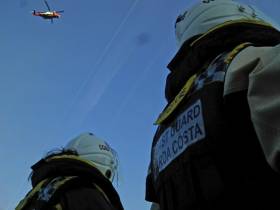Displaying items by tag: Lough Gur
Tralee Bay Wetlands and Lough Gur Lakeshore Among Green Flag Award Winners
Kerry’s Tralee Bay wetlands and Lough Gur lakeshore in Co Limerick are both winners in this year’s Green Flag awards.
Some 101 green spaces were selected for awards in Ireland out of a total of 150 across Europe, according to An Taisce’s environmental education unit.
Tralee Bay Wetlands Eco and activity park was the overall winner, and also the town winner in the Green Flag Pollinator awards.
Lough Gur Lakeshore Park and Visitor Centre in Limerick was one of two, along with Julianstown Community Garden in Co Meath, to receive special innovation awards.
Lough Gur installed 28 bee lodges to support solitary and native bees. The lodges were built by participants in the Probation and Linkage in Limerick scheme as part of the prison education programme, and were funded by Analog Devices.
 An Taisce's Green Flag flying at Lough Gur Lakeshore Park and Visitor Centre in Limerick
An Taisce's Green Flag flying at Lough Gur Lakeshore Park and Visitor Centre in Limerick
Other coastal award winners include Garinish Island and Fota Arboretum and Gardens in Co Cork and Derrynane House and Park in Co Kerry.
Participating countries in the international award scheme are Austria, Belgium, Finland, France, Germany, Ireland, the Netherlands, Portugal, Spain, Sweden and Turkey.
Britain, where the green flag was initiated in 1996, is no longer in the EU but has 2,216 parks – the largest number since the scheme began 27 years ago – which can raise green flags this year.
Like its blue flag counterpart on coastlines, the green flag award benchmarks excellence in the management of spaces which are open and free to the public. In this case, it highlights parks, gardens, grounds and wildlife sanctuaries which have made special efforts.
An Taisce’s environmental education unit published the full list here
An archaeologist who has pioneered work at Limerick’s Lough Gur has received an honorary doctorate from the University of Limerick (UL).
Rose Cleary was awarded an honorary Doctor of Science for her research over 40 years on the lake area.
Lough Gur is regarded as the only site in Ireland where traces of every age of humankind can be found.
Cleary, from Burncourt, Co Tipperary, has undertaken many internationally significant excavations in the lake’s region, and has found over 1,000 visible monuments across its landscape.
“With findings ranging across the full spectrum of Ireland’s history in Limerick – from mesolithic, neolithic, Bronze Age and Early Christian settlements to castles and tower houses, Rose’s research has opened a window into the lives of the earliest settlers to Ireland,” UL said.
 Rose is robed by her daughter Eve Mulcahy at the honorary doctorates at the University of Limerick Photo: True Media
Rose is robed by her daughter Eve Mulcahy at the honorary doctorates at the University of Limerick Photo: True Media
“With Lough Gur attracting over 110,000 visitors a year, Rose has been hailed for her contribution in putting Limerick on the map as a county of exceptional archaeological, historical, and cultural importance,” it said.
“ She is also acknowledged as an important role model for women seeking gender equality in the field of archaeology, having been appointed as a senior archaeologist in University College Cork in the 1980s, a time when it was uncommon for women to hold such high positions,”it said.
Cleary and Dr Maeve Lewis, psychotherapist and chief executive director of One in Four, the Irish charity supporting survivors of childhood sexual abuse, were awarded their honorary doctorates by UL president Prof Kerstin Mey for “their outstanding contribution to society”. Mey described Cleary as a “trailblazing archaeologist”.
The two women are among 3,500 graduates being conferred at UL over five days this week.
Woman Airlifted To Hospital After Injury At Lough Gur
#Rescue - Shannon’s Irish Coast Guard rescue helicopter airlifted an injured woman to hospital from the shores of Lough Gur yesterday evening (Saturday 4 February).
As BreakingNews.ie reports, the woman had been walking with family next to the Co Limerick lake when she sustained a leg injury in a fall on uneven ground.





























































